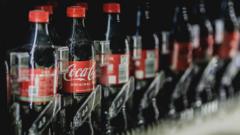As tariffs on aluminum imports threaten to raise costs for cans, Coca-Cola's leadership indicates a potential pivot towards increased use of plastic packaging, igniting debates about sustainability and corporate responsibility.
Coca-Cola Considers Boosting Plastic Use Amid Rising Tariffs Under Trump

Coca-Cola Considers Boosting Plastic Use Amid Rising Tariffs Under Trump
Coca-Cola's CEO warns that tariffs on aluminum could shift production to plastic bottles, raising environmental concerns.
In a recent call with investors, Coca-Cola's CEO, James Quincey, discussed how the company may adapt its packaging strategy in response to President Donald Trump’s tariffs. The 25% import tax on aluminum and steel could lead to higher prices for canned beverages, a staple of the beverage industry. As a result, Quincey suggested that Coca-Cola might shift to selling more products in plastic bottles, which can be more affordable in light of rising aluminum costs.
While this adaptation may provide a temporary solution for maintaining competitive pricing, it raises significant environmental concerns. Coca-Cola has faced criticism for its reliance on plastic, with environmental groups naming it the "top global plastic polluter" for six years running. Earlier, the company amended its sustainability goals from 50% recycled materials by 2030 to a more extended timeframe of 35% to 40% by 2035.
The decision to pivot towards plastic bottles highlights the tension between cost efficiency and environmental sustainability. Although aluminum cans are generally more recyclable compared to plastic, Coca-Cola's potential shift reflects the impact of regulatory measures on business strategies. Nearly half of the aluminum used in the U.S. is imported, making it vulnerable to the financial implications of tariffs, and Quincey noted that packaging costs are only a small part of overall expenses.
Moreover, the tariffs are accompanied by a broader regulatory context. Recently, President Trump signed an executive order undoing measures aimed at reducing plastic straw usage, further complicating efforts to tackle plastic pollution. This development poses additional challenges for companies like Coca-Cola that are trying to balance market demands with environmental responsibilities.
As Coca-Cola navigates these changes, the business landscape’s intersection with sustainability will remain a significant topic of discussion among stakeholders, consumers, and advocacy groups alike.
While this adaptation may provide a temporary solution for maintaining competitive pricing, it raises significant environmental concerns. Coca-Cola has faced criticism for its reliance on plastic, with environmental groups naming it the "top global plastic polluter" for six years running. Earlier, the company amended its sustainability goals from 50% recycled materials by 2030 to a more extended timeframe of 35% to 40% by 2035.
The decision to pivot towards plastic bottles highlights the tension between cost efficiency and environmental sustainability. Although aluminum cans are generally more recyclable compared to plastic, Coca-Cola's potential shift reflects the impact of regulatory measures on business strategies. Nearly half of the aluminum used in the U.S. is imported, making it vulnerable to the financial implications of tariffs, and Quincey noted that packaging costs are only a small part of overall expenses.
Moreover, the tariffs are accompanied by a broader regulatory context. Recently, President Trump signed an executive order undoing measures aimed at reducing plastic straw usage, further complicating efforts to tackle plastic pollution. This development poses additional challenges for companies like Coca-Cola that are trying to balance market demands with environmental responsibilities.
As Coca-Cola navigates these changes, the business landscape’s intersection with sustainability will remain a significant topic of discussion among stakeholders, consumers, and advocacy groups alike.





















